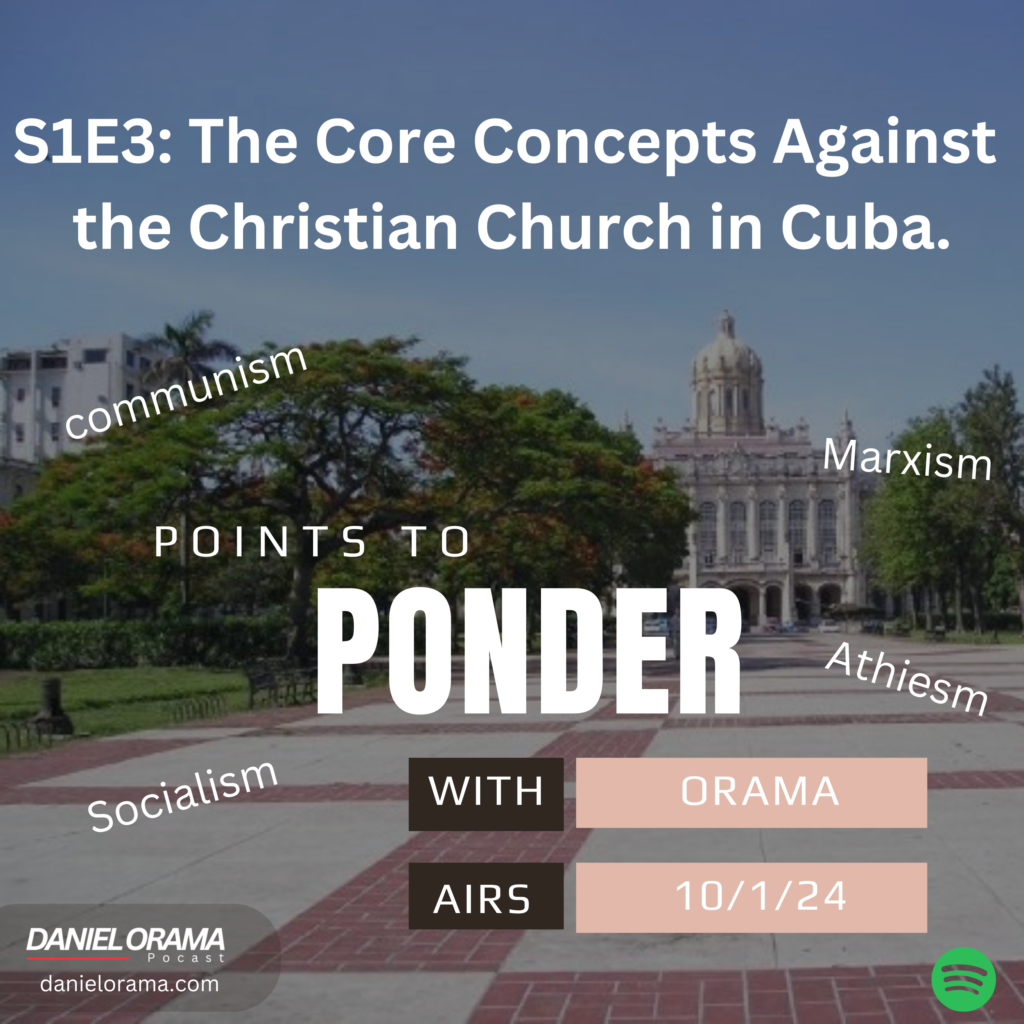I am excited that you have joined me today on Points to Ponder with Orama. Points to Ponder is a podcast and blog that explores discipleship, music, and worship. It also examines the political arena, music, and ideologies that affect the Christian church. In this blog, we explore the core concepts to help us better understand the opposition of worship in the Christian church in Cuba.
Core Concepts of Atheism, Marxism, and Communism
The key concepts for better understanding the opposition of worship in the Christian church in Cuba are rooted in the fact that the regime proclaimed itself a communist, Marxist-Leninist, and atheist society. According to author Peter Lemass, “The saddest thing for me about Cuba is its atheism. It is not just a case of Church and State being separate. It is official State policy that there is no God.”[1] The Communist regime disbelieves in the existence of God, and their whole education system is on that premise. The education system contradicts the teachings found in the Bible while claiming that there are no contradictions between Christianity and Socialism. Again, quoting Lemass, “Where do the contradictions between Christian teachings and socialist teachings lie?”[2] A contradiction found between biblical Christian teaching is that Socialism is against the whole of the family, which they say creates class inequality. That statement alone just created class inequality.
A critical concept is how Castro attempted to confuse Christianity with Marxist socialism by giving examples of how Jesus was for the poor and destitute. The realization is that the two have no commonality for a person who does not believe there is no God. Dennis P. Petri writes, “One pastor and his wife refused to send their children to a public school, ‘arguing that the state system emphasizes a Marxist-Leninist atheist ideology that contradicts their beliefs.”[3] Over five generations have been indoctrinated within Cuba’s public education system, teaching that there is no God. A person had the right of conscience to believe there was a God, but any attempts to mobilize the people beyond the church walls or home were subject to arrest.
Understanding Marxism Ideology Against the Christian Church in Cuba
To fully comprehend the origins and motivation behind Marxism, it is crucial to understand its historical context. In the early 1920s, Marxist ideology gained traction in Latin America; by the way, stop manipulating the Spanish people to suit your agendas. We have become the middle class of culture that is repeatedly put asunder and a manipulated driving force behind revolutionary efforts to achieve liberation and social change. Cuba played a pivotal role in the development of Marxism, with Carlos Baliño emerging as a key figure in promoting its principles. According to author Isabel Monal, “the early initiator and promoter of Marxism on Cuban soil was the laborer Carlos Baliño (1848- 1926), who had become a Marxist during his long stay in the United States.”[4] A Marxist during his stay in the United States? Your alarm should be wailing at this time.
Baliño expressed ideas that were socialist and Marxist. Quoting Monal, these included the belief “that social phenomena follow laws and that social struggles are influenced by significant forces within society.”[5] Baliño argued that Cuba needed a revolutionary uprising to overthrow capitalism and establish a new culture where the working class would hold political power. Baliño collaborated with Jose Marti, another revolutionary, to reach out to Cuban workers in Tampa and Key West, Florida. According to Monal, “Baliño joined Marti in his efforts to obtain support from the Cuban workers, especially the tobacco workers in Tampa and Key West, Florida.”[6] One reason for this collaboration was Baliño’s concern that the United States posed a growing imperialist threat to Cuba.
Marxism, a Revolutionary Communist Ideology
Marxism is a revolutionary communist ideology emphasizing the working class and enforcing government rule. Karl Marx and Frederick Engels introduced it in their Manifesto of the Communist Party. The founders depicted society’s history in this document as a series of class struggles. They argued that capitalism is a profoundly exploitative system, and according to their theory, the working class will overthrow the ruling bourgeoisie class through a revolution and establish the dictatorship of the proletariat. One would easily question whether establishing a dictatorship of a particular group exploits the people to cement a government’s agenda. As previously mentioned, “Following that, the workers ‘ state will abolish capitalism, build socialism, and eventually establish communism, a classless society of material abundance and stateless self-administration.”[7] A classless society stripped of their God-given talents to serve the community for the greater good dictated by the ruling government.
Religious Groups in Cuba Deemed a Potential Threat
Religious groups are seen by the Cuban regime as a potential threat due to their networks and resources that transcend borders and their disapproval of Communism. As a result, “In 1961, the new Cuban government declared itself officially atheist and implemented a militantly anti-religious policy.”[8] Furthermore, the 1975 Constitution made it unlawful to oppose the Revolution based on religious beliefs. A Cuban who is in the communist regime that receives the salvation of Jesus Christ is in danger, “Consequences for that individual and family members can be severe.”[9] Marxism, Communism, and biblical Christianity are not the same; the contradictions are evident by Fidel’s admittance of Atheism. I hope you take time to ponder these thoughts. God bless, and see you on the next one.
[1] Peter Lemass, “Fidel Castro’s Cuba.” The Furrow 36, no. 6 (1985): 374.
[2] Ibid., 375.
[3] Dennis P. Petri, “Christians in Cuba: Dealing with Subtle Forms of Repression” (Atlanta GA: 2022), 331.
[4] Isabel Monal, “Cuban Foundational Marxist Thought.” International Journal of Political Economy 34, no. 4 (2004): 11.
[5] Ibid., Monal, 12.
6] Ibid., Monal, 13.
[7] Karl Marx and Friedrich Engels, The Communist Manifesto, 236.
[8] Dennis P. Petri, 328.

